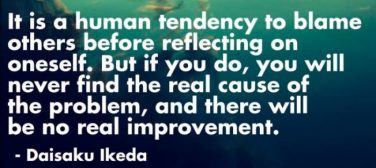“Accountability” is just another word for “blame”

“…there’s a tremendous bias against taking risks. Everyone is trying to optimize their ass-covering.”
– Elon Musk, Wired Magazine, October 2012
What a great quote! You’ve got to hand it to him, Elon Musk can really turn a phrase when he needs to.
I’ve been in the workforce now, officially, for just over 20 years. I’ve been in the software development industry for just over 10 years. And if I had a nickel for every time I heard some manager or executive say the word “accountability”, then I’d have a wheel-barrow full of nickels. The funny things is though, when managers and executives start throwing that word around, what they really mean is “blame”; as in “Who do we blame for this?”
Accountability is a big deal in the business world. This is mostly because there is money tied to whatever does or doesn’t get done. If the work does get done, then the business gets paid, usually. If the work doesn’t get done, well, then things start to get sticky and sometimes more than a little ugly (as in customer complaints, bad reviews, bad survey scores, late penalties and the like, all the way up to litigation). And that’s when “accountability” gets trotted out like some kind of urbane threat; like some two-bit muscle in a nice suit. It doesn’t matter how erudite the word sounds, it’s almost never whipped out without having some form of menace attached to it.
The funny thing, though, is that both threats and blame are universally childish and largely ineffectual. Threats and blame both come from the same emotional place; identifying ourselves with something outside of ourselves that, truth be told, we have little to no direct control over – in this case work – and then assigning a meaning to it in our heads. In our heads! That’s the best part! It’s all a matter of perspective, and it’s not even a particularly good or helpful perspective. But we all buy into it – or at least have bought into it – at some point in our careers.
And it’s oh, so easy to blame someone else when something goes wrong or doesn’t get done. It’s so easy it almost seems like second nature. And if we’re in a position of power or authority? Well, it’s even easier to cast blame then; and precisely because we are in a position of power we can even tack on some menace by bringing up “accountability”.
Ye gads! If that sounds like some kind of idiotic, asinine, emotionally-retarded playground dynamics, that would be because it is. In its entirety, it absolutely is. Blame is worthless. Threats are even worse than worthless.
Now, let me paint a different picture for you. When I encounter a problem at work, just like everyone else, I want to find out what happened. However, what I am looking for is excellence, not someone to blame, because the damage has already been done. No, what I am searching for is the root cause so that I can minimize that damage and prevent any future damage by way of creating an amazing experience than enables people to succeed. I honestly don’t care who did what beyond a clinical understanding of what happened, when it happened, and who was involved.
Every time something goes wrong it is an opportunity for me to communicate, mentor, train, foster trust, rectify a wrong, and strive for excellence. So many people are so wrapped up in identifying themselves with their careers, their work or their current jobs that they spend far too much of their time optimizing their ability to cover their own asses. And so, that’s what we get in the workplace; people preoccupied with dodging blame because that’s what they’ve learned to do to survive. But whatever happened to just fixing the problem?
Let me break this down for you…
- I firmly believe that 99% of behavioral dysfunction in humans is caused by simple misunderstandings.
- For humans, clear, honest, and open communication is second in importance only to breathing clean, fresh air.
- Continually focus on creating excellent and amazing experiences whatever you are involved in.
- Never cast blame. Simply identify the problem (by asking the Five Whys) and fix it. If that means taking the time to train or retrain someone or explain to them what is expected of them, then take the time and just do it.
- And after all is said and done, bring everyone together and clearly restate why we are doing what we do, reinforce role definitions and the rules of engagement so that everyone understands how and where they can have the largest possible positive impact on the process.
Honestly, if you do all of that and things are still going wrong, then at the very least, everyone will be on the same page. The simple fact is, people don’t want to go to work and fail. They don’t want to go do a job they hate. Take the time to talk with people, to listen to them, to get them on the same page and they’ll tell you what needs to be done to fix the problem without anyone having to assign blame or threaten anyone else with “accountability”.
